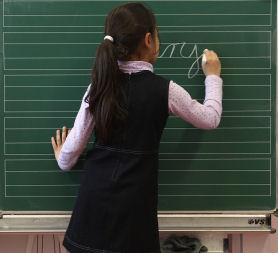Free Schools: What are the options?
Updated on 18 June 2010
As education secretary Michael Gove pledges to make it easier for groups to set up state-funded independent schools in England, Channel 4 News looks at the choice of schools parents will have.

Maintained Schools
Maintained schools are mainstream state schools, which are controlled and funded entirely or partially by the Local Education Authority (LEA), or the Education and Library Board in Northern Ireland.
There are 24,000 maintained schools in the UK, with 7,000 of these secondary schools.
All pupils in these schools follow the national curriculum and, with the exception of grammar schools, they do not operate a selective admissions policy.
The majority of maintained schools are community schools where the LEA owns the land and buildings, but they also include voluntary schools, foundation and trust schools.
The LEA also funds the school, employs the staff, provides support services and usually sets the admission procedures.
Voluntary schools
These types of schools can also be called a religious or faith school. There are two types of voluntary school, controlled and aided. In both cases the land and buildings are owned by a charity, often a religious organisation such as a church.
In voluntary aided schools, a governing body runs the school and employs the staff, while funding is split between the LEA, a governing body and a charity.
In voluntary controlled schools the LEA has a much bigger role in running and funding the school.
Foundation and trust schools
Foundation schools were set up by the Labour administration. They are run by a governing body, which employs the staff and sets the admissions criteria. Land and buildings are usually owned by the governing body or a charitable foundation.
A trust school is a type of foundation school which forms a charitable trust with an outside partner - for example, a business or educational charity - aiming to raise standards and explore new ways of working.
The decision to become a trust school is taken by the governing body, with parents having a say.
Specialist schools
Though they follow the national curriculum, specialist schools focus on a particular subject area. Examples include sports, technology or visual arts.
Grammar schools
They are the only state secondary schools that are allowed by law to select all their pupils on the grounds of high academic ability. They only exist in Northern Ireland and parts of England that have not abolished the 11-plus examination.
There 164 grammar schools in England and 69 in Northern Ireland.
Only education authorities in Northern Ireland have permission to set up new grammar schools. There are no state grammar schools in Scotland or Wales. Because they are funded by the state, grammar schools do not charge fees.
Non-maintained schools
Non-maintained schools are independent of control by the LEA, although academies retain some LEA influence.
Independent schools
In an independent or private school, the governing body is responsible for the day-to-day running of the school. It is funded through fees paid by parents and sometimes, charitable trust funds.
The headteacher, backed by the governing body employs the staff, procures support services and determines the school's admissions policy. Classes do not have to follow the national curriculum
City technology colleges
City technology colleges (CTCs) are independent non-fee paying secondary schools for pupils of all abilities.
The Department of Education and commercial sponsors fund the college and it is run in accordance with an agreement between two parties. They have more discretion to apply their own admission policy including the freedom to interview parents.
The pupils follow a curriculum that is similar to the national curriculum, with particular emphasis on technological and practical skills. There are only three CTCs remaining, after the 12 other colleges set up by the Thatcher government evolved into academies.
Academies
Academies are independently-managed, all-ability schools. They are set up by sponsors from business, charities or voluntary groups in partnership with the Department of Education and LEA.
Together they fund the land and buildings, with the government covering the running costs.
Scotland and Wales
Scotland and Wales have their own education systems. There are fewer different types of schools in Scotland, with most operating as mainstream state schools.
However, Wales has a similar range of schools to England. Michael Gove's proposed free schools will only be introduced in England.
You can find information on other types of school on the DirectGov website.
Further advice is available from the Citizens' Advice Bureau.





